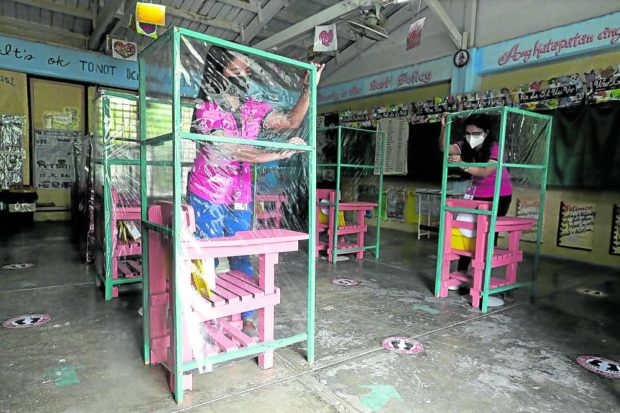Island town hopes to show it’s safe to send kids back to campus

SAFETY FIRST IN CLASS: Teachers Lynell Corbito and Aida Conchada prepare a classroom for the resumption of in-person classes in Tamulaya Elementary School in Polilio Island, Quezon province. (Photo by RICHARD A. REYES / Philippine Daily Inquirer)
POLILLO ISLAND, Quezon, Philippines — A few steps from the gate of Tamulaya Elementary School (TES) in Polillo, Quezon province, is a hand-washing area where visitors, students, and teachers are required to make a stop before going further into the campus.
Immediately next to it is the triage section where their body temperature will be checked and recorded.
From there, unlike in the prepandemic setup, everyone will now have to mind where they walk, following the arrows painted on the pavement, toward the buildings or rooms where they are expected, and then later on the way out of the compound.
This is a glimpse of what the “new normal” is going to look like at TES and 99 other public schools across the country that have been selected for the pilot resumption of in-person classes starting Nov. 15.
On Thursday last week, officials from the Department of Education (DepEd) conducted an ocular inspection to assess the school’s readiness for the test run. It was the first pilot school to get a visit from the DepEd Central Office.
Article continues after this advertisementIt may be one of the few places where locals have become confident enough that the worst of the pandemic is over as far as their community is concerned.
Article continues after this advertisementCOVID-free village
About a three-hour ferry ride across Polillo Strait from Real, Quezon, on the Luzon mainland, the island municipality of Polillo has only five active COVID-19 cases as of Nov. 5. Barangay Tamulaya itself has recently been declared COVID-free; it has recorded only five cases since the start of the pandemic.
The local vaccination drive in the barangay had covered about 56 percent of its target population of 567 people, but it was enough to convince officials that they had already achieved herd immunity.
Being considered low risk, Polillo thus met the main criteria for selection as a pilot school. But even with the recent DepEd visit that had journalists and camera crews in tow, the island remains officially closed to nonresidents.
Each classroom at TES would accommodate only seven to eight students per class. When the rooms were shown on Thursday, there were wooden and plastic barriers already installed around each chair.
The pilot schools and their host communities expect to learn some lessons in adjusting to the new normal during this initial “phase,” according to Education Undersecretary Nepomuceno Malaluan.
Polillo Mayor Cristina Bosque said that if the TES implementation would go smoothly, the measures adopted here can be a model for more schools that are lined up for reopening.
No online classes
Jeselyn Ballesteros, one of the parents who volunteered to help attend to the visitors during the inspection, said her village was just glad to be chosen for the dry run.
Before the health crisis, she said, she would accompany her daughter every day to kindergarten class and “watch her closely while she’s here.”
“When the pandemic came, she continued her studies at home,” Ballesteros told the Inquirer.
But cell phone signal was so weak and internet service was practically nonexistent on the island that the girl’s distance learning sessions had to rely solely on printed modules delivered to her house.
Despite these limitations, Ballesteros believed that her daughter didn’t miss out on her lessons, especially since she was able to personally attend to the girl as she studied.
But according to Mayor Bosque, not all parents were capable of helping and guiding their kids during this difficult period.
Dexter Villanueva, one of the seven TES teachers who will handle the class resumption, said the return of face-to-face lessons could finally close the learning gaps parents or guardians could simply not fill.
“Here at school, even though it’s limited, the teachers can guide them,” he told Malaluan during the ocular inspection.
TES has 82 pupils currently enrolled, from kindergarten to Grade 6. But only 49 students from kindergarten to Grade 3 can join in-person classes, while the remaining 33 in the higher grades will continue with the their modular learning sessions at home.
Lilibeth Torres, the head teacher, said all of the school’s teaching and nonteaching staff had already been vaccinated for COVID-19.
Not for everyone
In anticipation of problems or concerns that may arise from the return of children to the school, the barangay has formed a COVID-19 task force composed of community health workers, the district nurse and a dentist.
Even though the Department of Health (DOH) and the DepEd allow only kindergarten to Grade 3 students to participate in in-person classes, the school has already prepared those in Grade 4 to 6 once the coverage is expanded.
According to the DepEd timetable, those in the higher grades will have to wait till March next year.
But Malaluan said that this early, there was already a growing clamor from parents in the barangay to have older pupils included in the Nov. 15 reopening. ‘’That’s part of the feedback … but we won’t be able to implement it immediately because that’s a public health aspect from the DOH side,’’ he added.
A consultation with health officials may be in order. “[We will explain to the DOH] that we have here a class of 82 students … where all teachers and nonteaching personnel are already fully vaccinated, and there’s a growing number of vaccinations in the area.’’